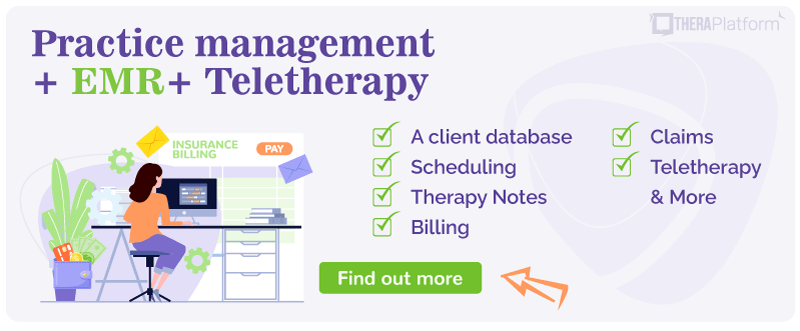Starting a private therapy practice as a side hustle

Starting a private therapy practice as a side hustle can feel scary and overwhelming. Quitting a paying job and starting a full-time private practice can make it feel even more daunting. Many therapists cannot afford to quit their job, financially invest in building a practice, and wait for the phone to ring to earn money. Some therapists choose to start a therapy private practice as a side hustle part-time while earning an income from another employment opportunity.
Typical therapy settings outside of a private practice office
Working in a therapy-type setting before starting a private therapy practice as a side hustle can provide you with excellent learning opportunities and experience. You can learn about managing a caseload, documentation, insurance plans, and cultivate your approach to therapy.
Looking for a full-time or part-time position providing therapy services in another setting can sync nicely while starting a private therapy practice as a side hustle.
Some settings to consider include:
- Community mental health centers
- Foster care and adoption agencies
- Non-profit agencies
- Government agencies
- Hospital settings (mental health and general)
- Substance abuse treatment programs
- Partial hospitalization programs
- Religious organizations
- Schools
- Telehealth
Telehealth is an especially convenient and cost-friendly option when starting a private therapy practice as a side hustle. With teletherapy, you can see clients remotely without the expenses associated with a traditional office like rent, office furniture and additional utility bills. Teletherapy does require some preparation and planning, however. For more information, see TheraPlatform’s telehealth academy.
Why therapists want to go into private practice
Therapists may feel attracted to the idea of starting a therapy private practice as a side hustle for many reasons. For most people, the freedom a private practice offers seems very appealing. But there are many other reasons as well.
Being the boss: You can create the business and practice of your dreams. You can choose the location, treat the clients that you want to treat, and utilize the treatment approach that you want to use. You do not have to work under the pressures and guidelines of a workplace or supervisor.
Create your own schedule: When building your private practice, you can establish the hours of your practice that best suit your needs. You have the flexibility to choose what days and times you want to see clients. You no longer need to work hours assigned to you, holidays that you do not want to work, or days when your children do not have school.
Choose your niche and treatment method: As part of starting a private therapy practice as a side hustle, you can choose the client population that you want to treat and treat them according to your trained treatment approach and style. You do not need to see clients that meet the requirements of your workplace or use a treatment approach imposed on you by an employer.
Earning potential: In private practice, you have a greater ability to maximize your income. As you grow your practice and gain more experience, you have greater earning potential than working under the salary cap of an employer. You do not need to wait for a raise or be subjected to budget cuts.

Fear factors of a private practice
Starting a private practice as a side hustle has some scary drawbacks for many people. Making a list of your concerning and stressful factors can help you to learn how to compensate for these challenges. Once you know what concerns you, then you can educate yourself about how to best overcome or address these issues. Starting a private therapy practice as a side hustle part-time also helps you gain knowledge, comfort, and confidence to face these fears.
Some therapists feel concerned about:
- The costs involved in establishing and running a practice
- Marketing the practice
- Building and maintaining a client base
- The actual business administration of running a practice
- Losing the guaranteed income, paid time off, sick days, and benefits from an employer
- Technology related to the practice
- Isolation from not working in an office setting
- Losing health insurance

Expenses to start a private practice
No doubt, starting a private therapy practice as a side hustle costs money. The expenses remain quite similar whether you begin full-time or part-time. Working another full-time or part-time position can help you to continue to earn income while paying for the expenses as your practice builds.
Typical expenses to start a practice include:
- Office rent and associated utilities
- Internet
- Phone
- Electronic health record
- Establishing the business entity
- Bookkeeping software and possible bookkeeping service
- Tax preparer/accountant fees
- Liability insurance
- Business insurance
- Any local business permits
- Website related expenses
- Domain name registration and hosting expenses
- Email (costs related to HIPAA compliant provider)
- Attorney related fees
- Marketing costs
- Costs for listings in any directories
- Telehealth platform (HIPAA compliant)
- Payroll expenses
- Tax expenses (differs with business entity type)
- Bank account fees
- Office supplies
- Office furniture and decoration
- Billing software fees
- Continuing education expenses
- HIPAA compliant web forms provider
- Consultation or supervision
- Fees associated with networking groups and/or costs for events
- Payroll if you plan to hire any staff or a virtual assistant
Learn a new skill: Sign up for our free telehealth course! Take me to the academy
How much money can you make in private practice?
This question depends on the therapist and the type of practice established. With a private practice, the therapist has control over earning potential. Do you take insurance or self-pay rates? How much reimbursement do you receive from insurance plans or your self-pay rate? How many clients do you plan to see each week? How much are you earning compared to your expenses? Creating a budget for your practice will help you to plan and scale your practice accordingly.
Many therapists struggle with thoughts related to valuing their worth, charging enough money, and collecting money from clients. Many therapists think “I didn’t get into this field to make a lot of money.” or “My client talks to me every session about financial stress. How can I collect the copay?” It is common to feel uncomfortable with the money part of running a practice, but this mindset will limit your earning potential. Seeking consultation or networking with other therapists established in private practice can help to overcome this mindset barrier.
Some common mistakes therapists make when starting a private practice
You will most likely make many mistakes when starting a private therapy practice as a side hustle. Mistakes can happen easily when working a full-time job and launching another side business when you do not dedicate enough time to the new business, rush launching it, or feel too fatigued from the full-time job.
Keep your eyes and mind open for some of these common mistakes so that you can prevent, avoid, or correct them when starting a private therapy practice as a side hustle:
- Not niching down and accepting any client who contacts you for the sake of having a client
- Accepting clients who you do not want to work with or do not have the experience/training to treat
- Not having an established no-show and cancellation policy
- Not charging and collecting all fees due to you upfront each session: no show, cancellation, copays, session fees, court costs, record requests, report writing, etc.
- Charging too low of a rate
- Accepting low-paying insurance plans
- Not having a website
- Not having a social media presence
- Not marketing
- Not networking
- Not starting/stopping sessions on time
- Not seeking assistance, help, supervision, consultation
- Not paying for needed supports (ex: technology, bookkeeping, accounting, taxes, legal)
- Working too much or not taking days off or time off of work
Watch the below video on common pain points in private practice and TheraPlatform’s solutions.
Start your free trial now
Starting a private therapy practice as a side hustle can be done while employed elsewhere. Take your time to learn, research, and seek consultation when necessary. You can build the practice of your dreams.
A good step in starting a private therapy practice as a side hustle is choosing a practice management EHR that can help eliminate busy work such as scheduling, notes and billing. TheraPlatform offers an all-in-one EHR, practice management and teletherapy tool for busy therapists looking to launch their own business. They also offer a 30-day, free trial with no credit card required.
More resources
- Identifying your ideal client
- Private practice marketing
- Therapy resources and worksheets
- Therapy private practice courses
- Ultimate teletherapy ebook
- The Ultimate Insurance Billing Guide for Therapists
- The Ultimate Guide to Starting a Private Therapy Practice




